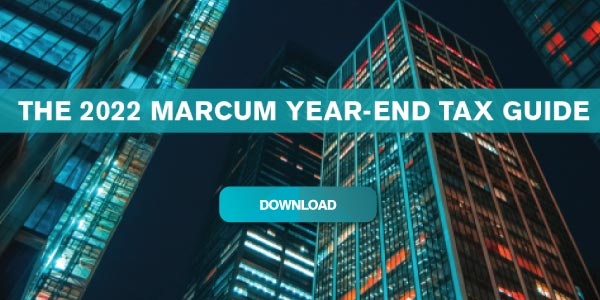The C-Corporation Advantage: Qualified Small Business Stock Exclusion
This article was previously published in the Marcum 2022 Marcum Year-End Tax Guide.
Originally enacted in 1993, Internal Revenue Code (IRC) Section 1202, Qualified Small Business Stock Exclusion (QSBS), was intended to encourage investment in small businesses by allowing individuals to avoid paying taxes on 50% of any taxable gain recognized on the sale of qualifying C-corporation stock.
As attractive as the original QSBS provision was, at that time C-corporations were subject to federal tax rates of up to 35% as well as double taxation (on both corporate income and dividends paid to shareholders). Although gains could potentially be excluded upon sale of the stock, many taxpayers found structuring a business as a pass-through entity (such as an LLC or an S-corporation) could result in income being taxed only once, at a lower tax rate.
Fast forward nearly 30 years later, various legislative changes made the C-corporation as a choice of entity much more appealing. Under current tax law, structuring an entity as a C-corporation may afford shareholders unparalleled tax benefits when the stock of the corporation qualifies as QSBS.
QSBS Gain Exclusion
Since first enacted, the maximum gain exclusion under Section 1202 has increased from 50% to 100% on sales of QSBS. Compounding the attractiveness of the increased QSBS gain exclusion is the reduced corporate tax rate which is now a flat 21% under the Tax Cuts and Jobs Act. The corporation will be taxed on profits and on the gain from the sale of the assets if the sale transaction does not qualify for the Section 1202 gain exclusion.
Depending on when the QSBS was acquired, Section 1202 allows non-corporate taxpayers to exclude from gross income 50%, 75%, or 100% of the gain from the sale or exchange of QSBS that is held for more than five years. To qualify for Section 1202 gain exclusion, certain requirements must be met by both the shareholder and the corporation.
Shareholder Level Requirements
For a shareholder to be eligible for gain exclusion under Section 1202, they must meet certain requirements. First, the shareholder cannot be a corporation; an individual must own the stock either directly or indirectly via an interest in a pass-through entity. Second, QSBS must be held by the shareholder for more than five years before it is disposed. Third, the shareholder must have acquired the stock when it was originally issued on or after August 10, 1993. Eligibility requirements will be met if the stock was acquired in exchange for money or other property but not if it was acquired by exchanging stock of another corporation. The requirements can also be met if the stock was issued to the original shareholder as compensation for services provided to the issuing corporation.
Corporation Level Requirements
For stock to qualify for Section 1202 favorable treatment, it must have been issued by an eligible corporation. Eligible corporations are any domestic C-corporations that are qualified small business corporations at the date the stock was issued and during substantially all of the period the stock was held. Additionally, the corporation must satisfy the active business requirement during substantially all of the taxpayer’s stock holding period. It is important to note that the C-corporation requirement means any stock issued by an S-corporation will not qualify as QSBS. However, if an LLC or an S-corporation converts to a C-corporation and subsequently issues stock, and all other QSBS requirements are satisfied, issued stock may qualify as QSBS.
The C-corporation must also be a qualified small business. An eligible corporation is a qualified small business if its aggregate gross assets do not exceed $50 million at any time from August 10, 1993, to immediately after the issuance of the stock. Additionally, there is an active business requirement. A corporation is deemed to have an active business (for purposes of meeting the QSBS test) if at least 80% of the corporation’s assets are used in the active conduct of one or more qualified trades or businesses. A qualified trade or business means any trade or business other than a business involving services performed in the fields of health, law, engineering, architecture, accounting, actuarial science, performing arts, consulting, athletics, financial services, or brokerage services. A business whose principal asset is the reputation or skill of one or more employees will not meet the qualified trade or business test.
The potential for gain exclusion from the sale of QSBS can be very beneficial to shareholders. However, it is important that all the requirements of Section 1202 are met by both the individual shareholder and the corporation.
Please consult your Marcum tax professional to see if you are eligible for this exclusion or to learn whether a conversion to a C-corporation entity can create this opportunity for your business.







